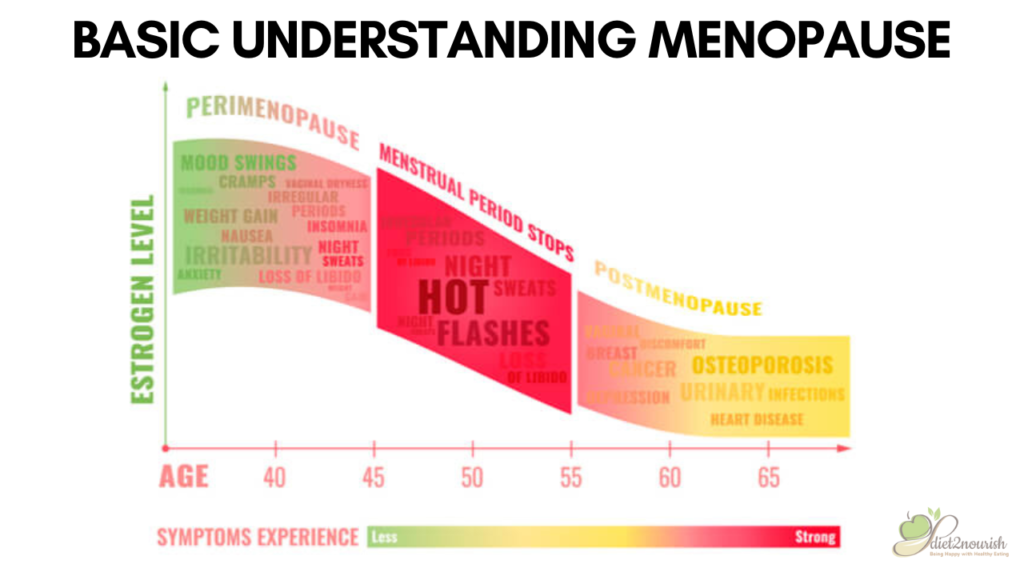Menopause Diet
Menopause is a natural biological process that marks the end of a woman’s reproductive years. Along with hormonal changes, menopause often brings about a range of symptoms that can impact a woman’s quality of life. While there is no one-size-fits-all approach to managing menopause, adopting a healthy and balanced diet can play a significant role in alleviating symptoms and supporting overall well-being. In this blog post, we will explore the importance of nutrition during menopause and provide practical tips and insights into creating a menopause diet that promotes optimal health.
1: Understanding Menopause
Menopause is a natural biological process that occurs in women typically around their late 40s or early 50s. It marks the end of reproductive years and is characterized by the cessation of menstrual periods. Menopause is a result of hormonal changes in the body, primarily a decline in estrogen and progesterone production by the ovaries.

During the perimenopausal phase, which can last several years before menopause, women may experience irregular menstrual cycles and various symptoms. These symptoms are caused by the hormonal fluctuations and can vary from woman to woman. Common symptoms include hot flashes, night sweats, mood swings, vaginal dryness, sleep disturbances, weight gain, and changes in libido.
Understanding menopause and its impact on the body is crucial for women to navigate this transitional phase with better knowledge and preparedness. By knowing what to expect, women can make informed choices to support their overall well-being.
It is important to note that menopause is a natural process and not a medical condition. However, the symptoms associated with menopause can significantly impact a woman’s quality of life. This is where adopting a holistic approach to managing menopause becomes essential.
Holistic management of menopause includes addressing various aspects of health, including nutrition, exercise, stress management, and sleep. Each of these factors plays a vital role in supporting overall well-being and mitigating the symptoms experienced during menopause.
In the following sections of this blog post, we will focus on the role of nutrition and diet in managing menopause symptoms. We will explore the nutrients that are particularly important during this phase, the impact of hormonal changes on metabolism and weight management, and how certain dietary choices can alleviate specific symptoms. By understanding the connection between nutrition and menopause, women can make informed choices to support their health and well-being during this transformative stage of life.
2: Nutrition and Menopause

Nutrition plays a crucial role in supporting overall health and well-being, and this holds true during the menopausal transition as well. The hormonal changes that occur during menopause can impact various aspects of a woman’s health, including metabolism, weight management, bone health, heart health, and mood. A well-balanced and nutrient-dense diet can help alleviate menopause symptoms and support optimal health during this phase.
One of the key considerations in menopause nutrition is the impact on metabolism and weight management. As hormonal levels change, metabolism tends to slow down, making weight management more challenging. It becomes important to focus on a diet that supports healthy weight maintenance or weight loss if necessary. This involves consuming a balanced mix of macronutrients, including lean protein, complex carbohydrates, and healthy fats. Prioritizing whole foods, such as fruits, vegetables, whole grains, and lean sources of protein, while limiting processed foods and added sugars, can help maintain a healthy weight during menopause.
Another important aspect of menopause nutrition is supporting bone health. With the decline in estrogen levels, women are at an increased risk of developing osteoporosis. Adequate intake of calcium, vitamin D, and magnesium is crucial during menopause to maintain strong and healthy bones. Foods rich in calcium include dairy products, leafy green vegetables, tofu, and almonds. Vitamin D can be obtained through exposure to sunlight or through dietary sources such as fatty fish, fortified dairy products, and egg yolks. Magnesium-rich foods include nuts, seeds, whole grains, and legumes.
Heart health is another concern during menopause as estrogen plays a protective role in cardiovascular health. Including heart-healthy foods in the diet, such as fatty fish (rich in omega-3 fatty acids), nuts, seeds, and antioxidant-rich fruits and vegetables, can support cardiovascular health during this phase.
Finally, menopause can bring about mood swings and sleep disturbances. Serotonin, a neurotransmitter that plays a role in mood regulation, can be influenced by diet. Consuming foods rich in tryptophan, an amino acid precursor to serotonin, can help support mood and sleep. Foods like turkey, eggs, nuts, seeds, and dark chocolate are good sources of tryptophan.
By understanding the impact of menopause on nutrition and making informed dietary choices, women can support their overall health and well-being during this transformative phase.
3: Creating a Menopause Diet Plan.
Creating a well-rounded and nourishing diet plan during menopause is essential to support overall health and manage symptoms effectively. Here are some key considerations and practical tips for designing a menopause diet plan:
1. Emphasize whole, nutrient-dense foods:
Focus on consuming a variety of whole foods that are rich in essential nutrients. Include plenty of fruits, vegetables, whole grains, lean proteins, and healthy fats in your daily meals. These foods provide vital vitamins, minerals, antioxidants, and fiber that support overall health and help manage menopause symptoms.
2. Balance macronutrients:
Include a balanced mix of macronutrients in your diet. Aim for a moderate intake of high-quality protein sources such as lean meats, poultry, fish, tofu, beans, and lentils. Choose complex carbohydrates like whole grains, legumes, and starchy vegetables for sustained energy. Incorporate healthy fats from sources like avocados, nuts, seeds, and olive oil to support hormone production and brain health.
3. Phytoestrogens:
Phytoestrogens are plant compounds that have a mild estrogenic effect in the body. Including foods rich in phytoestrogens can help alleviate menopause symptoms. Good sources include soy products (tofu, tempeh, edamame), flaxseeds, sesame seeds, lentils, and chickpeas. Incorporate these foods into your diet to support hormonal balance.
4. Calcium and vitamin D:
As mentioned earlier, menopause increases the risk of osteoporosis. Ensure an adequate intake of calcium-rich foods like dairy products, leafy green vegetables, almonds, and fortified plant-based milk. Additionally, vitamin D helps with calcium absorption, so aim for regular sunlight exposure and include dietary sources like fatty fish, fortified dairy alternatives, and egg yolks.
5. Hydration and moderation:
Stay hydrated by drinking plenty of water throughout the day. Limit caffeine and alcohol intake as they can exacerbate menopause symptoms like hot flashes and disrupt sleep patterns. Opt for herbal teas, infused water, or decaffeinated beverages as alternatives.
6. Meal planning and portion control:
Plan your meals in advance to ensure a well-balanced diet. Use measuring cups, food scales, or visual cues to maintain appropriate portion sizes. Be mindful of calorie intake if weight management is a goal, but always prioritize nutrient density over restriction.
7. Consider individual needs and preferences:
Every person is unique, and dietary requirements can vary. Listen to your body, pay attention to how specific foods make you feel, and make adjustments accordingly. If needed, consult a registered dietitian or healthcare professional to tailor a diet plan to your specific needs.
Remember, a menopause diet plan is not a one-time fix but a long-term commitment to overall health and well-being. Stay consistent, be patient, and make adjustments as needed based on your body’s response. Combined with regular exercise, stress management, and self-care practices, a well-designed menopause diet plan can make a positive impact on your journey through this transformative phase of life.
4: Managing Menopause Symptoms with Diet
Menopause brings about a range of symptoms that can significantly impact a woman’s daily life. While diet alone cannot eliminate all symptoms, it can play a supportive role in managing and alleviating certain menopause-related issues. Here are some dietary strategies to help manage common menopause symptoms:
1. Hot flashes and night sweats:
Certain foods and beverages can trigger or worsen hot flashes. Spicy foods, caffeine, alcohol, and hot beverages are common culprits. Instead, focus on incorporating cooling foods like cucumbers, watermelon, mint, and citrus fruits. Additionally, soy products, flaxseeds, and foods rich in omega-3 fatty acids (salmon, walnuts) may help reduce the frequency and intensity of hot flashes.
2. Weight management:
As metabolism tends to slow down during menopause, maintaining a healthy weight can become more challenging. To support weight management, choose whole, nutrient-dense foods that are low in calories but high in fiber. These include vegetables, fruits, whole grains, and lean proteins. Portion control is crucial, and mindful eating practices can help prevent overeating.
3. Mood swings and irritability:
Fluctuating hormones during menopause can affect mood and emotional well-being. Incorporate foods that support brain health and mood stability. Foods rich in omega-3 fatty acids, such as fatty fish (salmon, mackerel), chia seeds, and walnuts, have shown to have positive effects on mood. Additionally, complex carbohydrates from whole grains, fruits, and vegetables can support the production of serotonin, a neurotransmitter associated with mood regulation.
4. Sleep disturbances:
Hormonal changes, night sweats, and mood swings can disrupt sleep during menopause. Avoid heavy meals close to bedtime and limit caffeine and alcohol intake, as they can interfere with sleep quality. Instead, incorporate sleep-promoting foods such as tryptophan-rich foods (turkey, eggs, nuts), magnesium-rich foods (spinach, almonds, pumpkin seeds), and herbal teas like chamomile or lavender.
5. Bone health:
Estrogen decline during menopause increases the risk of osteoporosis. Adequate calcium, vitamin D, and magnesium intake are crucial for maintaining strong bones. Incorporate calcium-rich foods like dairy products, fortified plant-based milk, and leafy green vegetables. Ensure sufficient vitamin D through sunlight exposure or dietary sources like fatty fish and fortified foods. Magnesium-rich foods such as nuts, seeds, and legumes can also support bone health.
6. Heart health:
Estrogen decline during menopause can impact cardiovascular health. Choose heart-healthy fats like avocados, olive oil, and nuts. Include fatty fish, rich in omega-3 fatty acids, at least twice a week. Focus on whole grains, fruits, vegetables, and fiber-rich foods to support heart health.
Remember, managing menopause symptoms is a comprehensive approach that involves multiple lifestyle factors, including diet. It is crucial to listen to your body, make mindful choices, and prioritize self-care. If symptoms persist or significantly impact your quality of life, consult with a healthcare professional for personalized guidance and support.
Conclusion
As women enter menopause, prioritizing a healthy and balanced diet becomes crucial in managing symptoms and supporting long-term health. By understanding the changes happening in the body and making conscious choices regarding nutrition, menopausal women can navigate this transitional phase with greater ease. A menopause diet that includes nutrient-dense foods, phytoestrogens, and essential nutrients can alleviate symptoms such as hot flashes, support bone and heart health, and contribute to overall well-being. Combined with regular exercise, stress management, and sufficient rest, a holistic approach can empower women to embrace menopause as a new chapter of life with vitality and grace.
Frequently Asked Questions (FAQs)
Q: Why is nutrition important during menopause?
A: Nutrition plays a vital role during menopause as it supports overall health and helps manage the symptoms associated with this transitional phase. Hormonal changes during menopause can impact metabolism, weight management, bone health, heart health, mood, and sleep patterns. A well-balanced and nutrient-dense diet can help alleviate these symptoms and support optimal well-being.
Q: What should be included in a menopause diet?
A: A menopause diet should include a variety of whole, nutrient-dense foods. Emphasize fruits, vegetables, whole grains, lean proteins, and healthy fats in your meals. It is important to balance macronutrients by incorporating an adequate amount of protein, complex carbohydrates, and healthy fats. Additionally, including phytoestrogen-rich foods such as soy products, flaxseeds, and legumes can help manage hormonal fluctuations. Adequate intake of calcium, vitamin D, and magnesium is crucial for supporting bone health during menopause, so include dairy products, leafy greens, and fortified foods in your diet. Hydration is also important, so drink plenty of water throughout the day and limit caffeine and alcohol consumption. Lastly, consider individual preferences and needs while designing a menopause diet plan and consult with a healthcare professional for personalized guidance.










